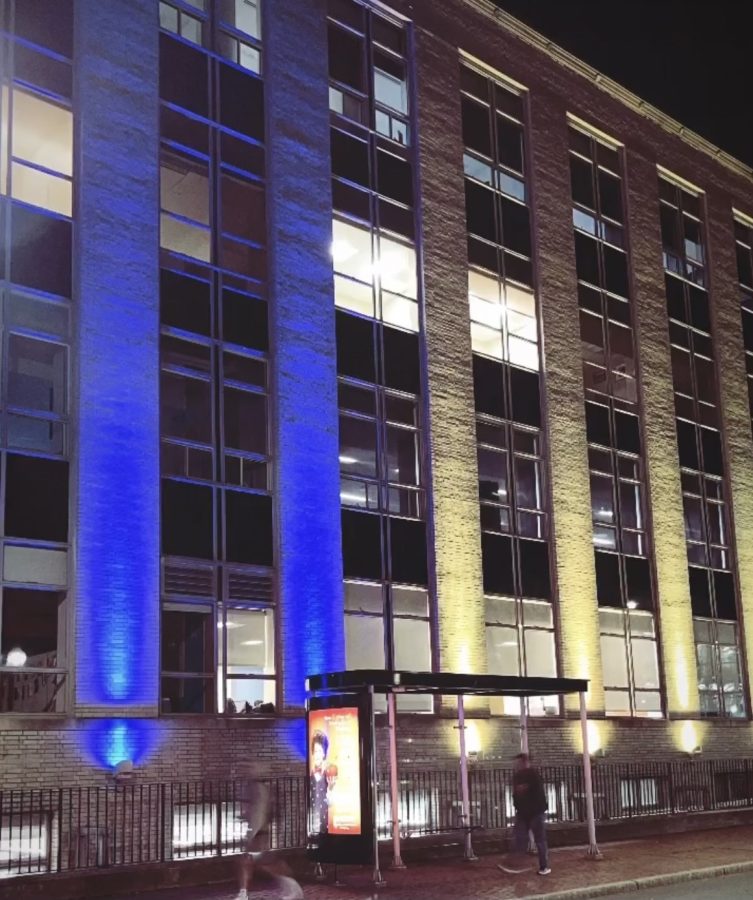How Northeastern University Responded to Students’ Concerns Surrounding the Conflict in Ukraine
Written by Anna Biggs
A building a Northeastern University lit up yellow and blue in support of Ukraine. Photo by Emma Casali
May 24, 2022
Ukrainian students at Northeastern University have spent the past two months watching as their home cities are destroyed, their people are massacred and their families live in fear. Worried and anxious, they have asked for help from Northeastern. But so far, they are not happy with the school’s response.
Students, in multiple emails to administration, said they are struggling to manage their academic and financial needs while their families are stuck in a war zone.
“When the war started, the initial reaction from Northeastern University was underwhelming and disappointing,” said a fourth year Ukrainian student at N.U. “Every time that we would individually try to talk to financial services or a dean, we would be brushed off,” the woman said.
A group of Ukrainian students, led by this student who asked to remain anonymous, drafted an open letter to the school. The students asked for financial aid on a case-by-case basis, reduction in academic workloads and the holding of events. “That letter unfortunately was completely ignored,” she said.
Since then, the university has made efforts to organize events like vigils or open discussion forums to support their Ukrainian students, but the student expressed frustration that these efforts did not proactively make a difference. While she thanked them for their attempts, she still felt unsupported and abandoned by the university that she has loved for four years.
Graduating in just a few weeks, “This is not the memory that I want to have of this school,” she said.
Another student, Sasha Brykailo, shared this same frustration. Brykailo is a third year international affairs major, and she is currently stuck in Amsterdam after having to flee Kyiv when Russia invaded. She has spent this semester on medical leave from classes, and planned to return to Boston in the fall before being forced into refuge in the Netherlands.
“I reached out on the first day of the war, and the only thing that they sent me were links to things I already knew about and were already available to all students,” said Brykailo. She recognized that Northeastern has made some attempts to support their students, but felt that it is not enough. She shared that she was already stressed about her return to Boston and Northeastern in the fall, which was only made worse by the emotional distress caused by the war in her home city, and is looking for some sign of relief in a show of support from the university.
Brykailo expressed hope for some financial aid, as well as support in her safe return back to the United States.
On March 15, the University of Chicago offered full free tuition for students affected by the war in Ukraine. This policy includes both current students and incoming freshmen starting classes this fall. While Brykailo recognized that this is not possible for all universities, she stressed that Northeastern should take their example by offering more proactive reassurance for their students, especially considering the financial means of the private research institution.
Both students emphasized the appreciation that they have for their professors and peers during this time. “The students are supporting us, the faculty are supporting us, but the people at the top are not doing anything and refusing to say anything,” said Brykailo. “I had a professor email me, and I was really touched that she went out of her way to reach out to me.”
A survey was sent out to Northeastern students regarding their feelings towards the war and the university’s response. About 20 students responded, with most unhappy with the way Northeastern is handling the situation.
First-year student Anabel Scales said, “Rallies and petitions aren’t helpful unless they follow through with real help like donations or funding for the Ukrainian army.” This response reflects the feelings of both Ukrainian students in their encouragement for the university to take action in a way that can truly enact change. Scales continued on to say that she would be satisfied if Northeastern were to offer mental health support, specifically for Russian and Ukrainian students as they deal with such an uncertain and challenging situation. “It would also be helpful if they organized clothing or medical aid drives for soldiers or victims of the war,” said Scales.
Another first-year student, Sarah Wang, offered a similar stance. “It’s all for show,” said Wang. “Actual Ukrainian students get very minimal support.”
On the other hand, others expressed satisfaction with the schools’ response. One student, Daniel Hellreigel, responded, “I think Northeastern is doing a great job at the moment.” He liked how the university lit up Ell Hall, one of the most prominent buildings on campus, in lights of blue and yellow. Northeastern University’s Instagram page features photos of this event and a few more that broadcast their support for Ukraine and their Ukrainian students. While many people are proud of these events and express their appreciation in the comments, many push the school to do more.
“This is nice, but why has there been no response to the concerns of Ukrainian students? The email from the Chancellor yesterday was frankly ridiculous, and our reply with a list of concerns has yet to receive a response from the university,” wrote a Ukrainian student advocating for help for her and her peers.
This remark and others got no response from the university, and Ukrainian students are still waiting for a sign that they will be able to feel safe and supported in the coming semesters.

